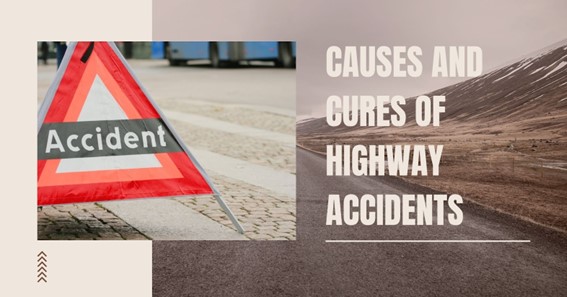Highway accidents have been a significant source of deaths and fatal injuries. According to the World Health Organization, approximately 1.35 million people die in road crashes annually. These numbers have been a source of concern by governments across the world.
But then, what are the causes of these highway accidents? This post will discuss what leads to these accidents and the potential remedies. It has all the information needed to mitigate them and ensure highways are safer. Read on for all you should know about highway crashes.
Let’s get started.
Causes of Highway Accidents and How To Avoid Them
1. Distracted Driving
This is probably the number one cause of accidents on highways. That’s not to say drivers cannot get involved in accidents if they are alert. However, reaction time significantly reduces when a driver is distracted. Your phone or the person on the co-driver seat can be distractors.
Prevention: Avoid anything that takes your eyes and attention off the road. You can turn off your phone or keep it out of sight if you can’t resist touching it when it rings. Also, pulling out of the road and then resuming driving later is advisable if something needs your urgent attention.
Click here – How is virtual work valuable for large companies?
2. Night Driving
Night blindness is another major cause of highway accidents. A report by the National Safety Council says that driving at night is three times riskier than during the day. Visibility gets poorer at night when the darkness sets in. It’s even worse when someone is visually impaired because they can barely see.
Prevention: If you experience night blindness, ensure you aim your headlights correctly. Also, dim your dashboard, clean the windshield, and drive slowly. You can avoid two-lane highways if you aren’t sure about your vision.
3. Bad Weather
You can also risk getting involved in a crash due to bad weather. Various types of weather can get classified as bad. For instance, it could be icy, windy, foggy, flooding, etc. All these types of weather can affect how you drive. In fact, some of the most dangerous highways in the US are located in states that experience severe weather changes.
Prevention: It would be best to learn how to drive safely in such conditions. Ensure you check the safety of your car before starting to drive, turn on your lights to improve visibility, and drive slower than usual.
4. Shooting Gaps
Sometimes staying in traffic for too long can be frustrating. You start to feel like things aren’t moving, and you want to go ahead of the cars before you. This could make you start changing lanes without caring about other motorists or speeding than the cars in front.
This behavior is often referred to as shooting gaps. It can be risky because other drivers might not predict your actions quickly. This could lead to a crash that could end up in a lawsuit.
Prevention: The best thing to do is be patient even when you feel that traffic isn’t moving as fast as you want. Divert your attention to things that you like to kill time. You can play music or listen to the radio to lift your mood.
5. Tire Blowouts
A tire blowout accident happens when a tire loses all of its air at once. This can be because it’s worn out or damaged by some object on the road. A tire blowout can be sudden, and it might make you panic. The vehicle might lose control, and keeping it in the lane will be tricky.
Prevention: The best way to handle a tire blowout is to stay calm. You should hold your steering wheel firmly and keep the car in your lane. Avoid applying emergency brakes because the car will gradually slow down. These are the best tips for avoiding a fatal tire blowout accident.
6. Overspeeding
Going too fast can also put you at risk of an accident. A car is easier to control when moving slower than when speeding. There are speed limits on highways, but most drivers don’t stick to them, especially on smooth highways. This makes overspeeding another cause of crashes.
Prevention: As a driver, you should be guided by the speed of traffic going in your direction. It would be best to look at the road and weather conditions. In short, you are responsible for the decisions you make.
7. Fatigue
Fatigue-related accidents contribute immensely to total road crashes. According to the NHTSA, fatigue or drowsy-driving-related accidents are among the most common on highways. Fatigue can make you fall asleep, lowering your reaction time and decreasing performance.
In addition, most fatigue-related accidents happen at night and in rural areas. If you’ve driven all day, you might start feeling tired at night. Also, you’ll become less alert on rural roads because they have less traffic.
Prevention: The remedy for this is to take time to rest. You can go to different stops or have another driver with you. In addition, doing a lot of exercise and drinking water can ensure this feeling disappears.
8. Tailgating
If you’ve been a driver for some time, then tailgating is something you see so often. However, it is one of the riskiest practices on highways. If you haven’t seen it, tailgating occurs when a car follows another too closely. This is mainly on major roads where speeds are often high.
There are various reasons you shouldn’t tailgate. Following a car too closely might mean you won’t see its number plate and brake lights. You might not respond quickly if the car in front of you brakes instantly. You’ll end up ramming into it, and the consequences can be very severe.
Prevention: Regardless of the traffic situation, it is best to give each vehicle the space they need so that they can freely move in case of any emergency. Also, this will reduce the chances of hitting a car from behind if the driver brakes or takes an unexpected turn.
9. Drunken Driving
This is a significant cause of road crashes in the world. Many people take alcohol to celebrate some momentous occasion. However, a celebration can be a misfortune if you mix alcohol with driving. It is advisable only to drive when free from alcohol and drugs, including prescription pills.
Prevention: You should avoid consuming alcohol if you must drive. Having a friend drive you if you are going out for a party is advisable. You can use a cab to and from if drinks will get served at the venue to avoid the temptation to drive. This will help mitigate a potential road crash.
10. Avoiding Safety Gears
The essential safety gear in a vehicle is a safety belt. But some people ignore the need for a safety belt and go on to drive. If you are a cyclist, an essential gear you must have is your helmet. Failure to wear these essential gear might lead to fatal injuries in case of a crash.
Prevention: Ensure you always wear safety gear before starting your journey and avoid driving your car if safety belts are missing. Remember, your airbags might not work if you don’t wear a safety belt. Avoid leaving your helmet at home, even for the shortest rides on highways.
11. Running Red Lights
This might seem obvious because it has become a common sight on highways. However, it isn’t advisable to jump a red light even if you are in a hurry. Some people blame this lousy behavior on saving time and fuel. But it jeopardizes their lives and those of other road users.
Prevention: Always be patient at road intersections. Be aware of other road users and always care about their safety. Please avoid hooting at other drivers in an attempt to push them into running a red light. This might put pedestrians or other cars crossing ahead at risk.
12. Structural Damage
Damaged roads can also be a significant cause of highway accidents. Potholes and other structural damage are to blame for many accidents happening today. Drivers sometimes feel frustrated because they must slow down whenever they come across a pothole.
Prevention: Governments have a role to play in reducing highway accidents. They should ensure roads are smooth and safe for every road user. If there are no potholes, there’ll be no need to unexpectedly swerve into another lane and cause a collision with oncoming traffic.
Conclusion
Now you know the leading causes of the many highway accidents reported annually. It is possible to prevent a huge percentage of these causes. This is because most of them are a result of driver recklessness. This means being cautious on roads can help reduce crashes.
You should start driving carefully if you’ve been a bit reckless. Also, knowing the most dangerous highways can help you exercise more caution while driving. We have shared some tips you’ll need to drive safely on even the worst roads in America.
But then, do not panic if involved in a crash. Take the proper steps including seeking medical attention and informing the police. Also, call your attorney and inform your insurance company before calling anyone else.
Click here – What Is Browsing Fingerprinting and How Can You Avoid It?





